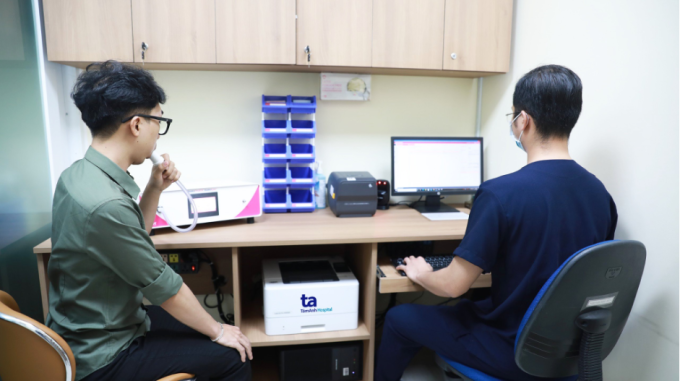Breath hydrogen testing is used to diagnose conditions such as irritable bowel syndrome, small intestinal dysbiosis, and lactose intolerance.
Dietary sugars such as fructose and lactose, if not absorbed in the small intestine, will move to the colon, be fermented by intestinal bacteria, forming methane or hydrogen gas or both.
MSc. Dr. Le Thanh Quynh Ngan, Head of the Department of Gastroenterology, Tam Anh General Hospital, Ho Chi Minh City, said that the methane hydrogen test is used when a patient is suspected of having irritable bowel syndrome, carbohydrate malabsorption (lactose, fructose, sucrose or sorbitol intolerance), small intestinal dysbiosis, functional dyspepsia, bloating, flatulence, and indigestion. People with chronic inflammatory bowel disease, chronic pancreatitis, and intolerance to milk and dairy products can also do this test.
To prepare for the methane hydrogen test, the patient must fast for at least 6-8 hours before the test, not have had a colonoscopy or taken antibiotics within the previous month, and avoid taking laxatives within a week. Limit sugary foods (milk, candy, honey, fruit), and do not smoke during the test. Test results are available after 2-3 hours.

Doctor Quynh Ngan examines a patient before doing a methane hydrogen test. Photo: Provided by the hospital
To do this, the patient breathes into the breath analyzer. Before blowing into the breathing tube, the patient takes a deep breath, holds the breath for about 10-15 seconds, then blows strongly into the breathing tube. Then, drink the sugar water and repeat the above steps about 5-6 times.
The doctor will take breath samples over the next few hours, each time about 15-30 minutes apart. During this time, the patient should limit physical activity and record any digestive symptoms such as abdominal pain, bloating, flatulence, etc.
Dr. Ngan said that hydrogen levels are measured in parts-per-million (ppm), which vary depending on the specific disease. The normal hydrogen level in a healthy digestive system is below 16 ppm. If the measured result is higher than this number, the patient may have problems with poor carbohydrate absorption, intestinal dysbiosis, etc. Depending on the results, the doctor will diagnose and prescribe appropriate treatment.

Patients do methane hydrogen test according to technician's instructions. Photo: Provided by hospital
According to Dr. Ngan, the methane hydrogen test is non-invasive and has almost no side effects. However, when breathing into the analyzer and drinking the sugar water, the patient may feel discomfort in the abdomen.
This test is not recommended for children under two years of age, unless directed by a pediatrician or gastroenterologist.
Le Thuy
| Readers ask questions about digestive diseases here for doctors to answer |
Source link


![[Photo] The beauty of Ho Chi Minh City - a modern "super city" after 50 years of liberation](https://vstatic.vietnam.vn/vietnam/resource/IMAGE/2025/4/18/81f27acd8889496990ec53efad1c5399)
![[Photo] Closing of the 4th Summit of the Partnership for Green Growth and the Global Goals](https://vstatic.vietnam.vn/vietnam/resource/IMAGE/2025/4/17/c0a0df9852c84e58be0a8b939189c85a)
![[Photo] National Assembly Chairman Tran Thanh Man meets with outstanding workers in the oil and gas industry](https://vstatic.vietnam.vn/vietnam/resource/IMAGE/2025/4/17/1d0de4026b75434ab34279624db7ee4a)
![[Photo] Nhan Dan Newspaper announces the project "Love Vietnam so much"](https://vstatic.vietnam.vn/vietnam/resource/IMAGE/2025/4/17/362f882012d3432783fc92fab1b3e980)
![[Photo] Promoting friendship, solidarity and cooperation between the armies and people of the two countries](https://vstatic.vietnam.vn/vietnam/resource/IMAGE/2025/4/17/0c4d087864f14092aed77252590b6bae)



























![[Photo] General Secretary To Lam receives French Ambassador to Vietnam Olivier Brochet](https://vstatic.vietnam.vn/vietnam/resource/IMAGE/2025/4/17/49224f0f12e84b66a73b17eb251f7278)
































































Comment (0)